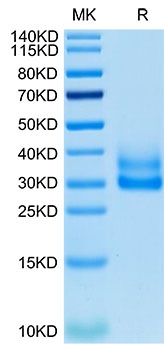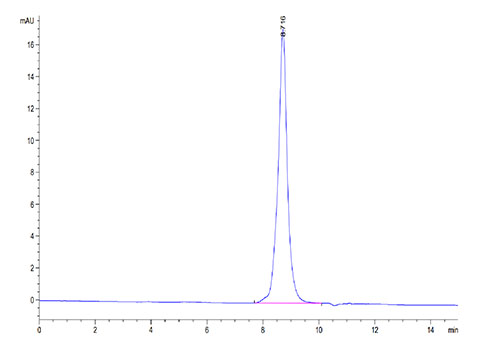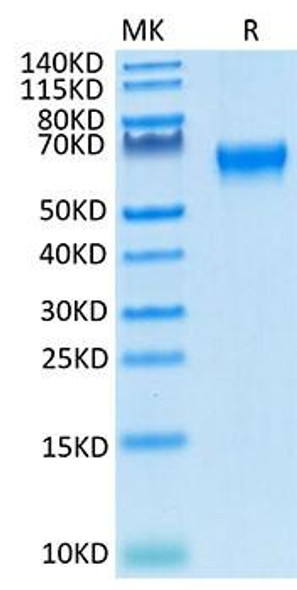Description
Recombinant Cynomolgus/Rhesus macaque TNFRSF9/4-1BB Protein
The Recombinant Cynomolgus/Rhesus macaque TNFRSF9/4-1BB Protein is a high-quality recombinant protein produced for advanced research applications in molecular biology and biotechnology. This protein serves as a critical reagent in various experimental contexts, including functional studies, binding assays, and therapeutic development programs, providing researchers with a standardized and reliable tool for investigating protein function and interactions.
This product (SKU: RPCB1727) is produced using HEK293 cells and features a C-His tag for convenient detection and purification. The protein exhibits a calculated molecular weight of 18.4 kD with an observed molecular weight of 30-40 kDa under denaturing conditions, achieving ≥ 95 % as determined by Tris-Bis PAGE;≥ 95 % as determined by HPLC., ensuring exceptional quality and consistency for research applications.
Key Features
| High Purity by Affinity Chromatography | |
| Mammalian & Bacterial Expression Systems | |
| High lot-to-lot consistency via strict QC |
| Product Name: | Recombinant Cynomolgus/Rhesus macaque TNFRSF9/4-1BB Protein |
| SKU: | RPCB1727 |
| Size: | 100 μg |
| Reactivity: | Cynomolgus/Rhesus macaque |
| Synonyms: | CD137, TNFRSF9, 4-1BB ligand receptor, 41BB, 4-1BB, CDw137, FLJ43501, ILA, T cell antigen ILA |
| Tag: | C-His |
| Expression Host: | HEK293 cells |
| Calculated MW: | 18.4 kD |
| Observed MW: | 30-40 kDa |
| Gene ID: | 102127961 |
| Protein Description: | High quality, high purity and low endotoxin recombinant Recombinant Cynomolgus/Rhesus macaque TNFRSF9/4-1BB Protein (RPCB1727), tested reactivity in HEK293 cells and has been validated in SDS-PAGE.100% guaranteed. |
| Endotoxin: | < 1 EU/μg of the protein by LAL method. |
| Purity: | ≥ 95 % as determined by Tris-Bis PAGE;≥ 95 % as determined by HPLC. |
| Reconstitution: | Centrifuge the tube before opening. Reconstitute to a concentration of 0.1-0.5 mg/mL in sterile distilled water. Avoid vortex or vigorously pipetting the protein. For long term storage, it is recommended to add a carrier protein or stablizer (e.g. 0.1% BSA, 5% HSA, 10% FBS or 5% Trehalose), and aliquot the reconstituted protein solution to minimize free-thaw cycles. |
| Storage: | Store at -20℃.Store the lyophilized protein at -20℃ to -80 ℃ up to 1 year from the date of receipt. After reconstitution, the protein solution is stable at -20℃ for 3 months, at 2-8℃ for up to 1 week. |
4-1BB, is also known as CD137, is a type 2 transmembrane glycoprotein receptor belonging to the TNF superfamily.CD137 can be expressed by activated T cells, but to a larger extent on CD8 than on CD4 T cells. In addition, CD137 expression is found on dendritic cells, B cells, follicular dendritic cells, natural killer cells, granulocytes and cells of blood vessel walls at sites of inflammation.








